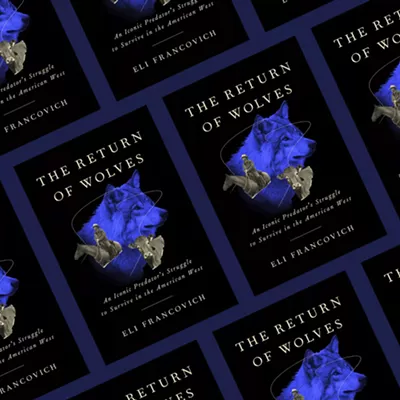For years, northeast Washington has been tussling over the local gray wolf packs, with environmentalists celebrating their resurgence and ranchers furious about instances where wolves attacked their cattle. The debate isn't just over biology facts and economic impact figures — it's over the public image of the wolf itself.
So Spokane resident Hank Seipp, director of the wolf-friendly Western Wildlife Council, is launching a program called Into the Woods in an attempt to showcase the fight from another angle. He and a team of volunteers are putting out dozens of wildlife cameras into local forests in an attempt to capture footage of wolves and, occasionally, cattle.
The responses have been lightly edited for length and clarity.
INLANDER: How many cameras and volunteers are we talking about?
SEIPP: We have over 40 high-definition cameras. We have great range from 80 to 100 feet at night, so we can get good night videos and pictures.
Currently, there's six people [placing cameras.] But they're all volunteers. I don't know their names. Nor do I want them identified and possibly losing their positions and their jobs. These gentlemen who are placing the cameras are also going to be responsible for checking them at least once every 30 days
What's the plan for the footage?
Well, we're hoping to put together a 60-minute feature film that discusses wolves. We have some guest commentators who will be speaking during this feature presentation to be able to be passed around to K-12 [schools] and beyond and probably to a lot of the community colleges. And they're going to be able to get the basics on wildlife biology, with what's going on with different imperiled and endangered species, such as lynx, wolverines, wolves, grizzly bears, etc. And we are looking for signs of those critters up there. We'll put cameras up and see what we can find.
One of the things that I believe that is missing is showing [people] the real animals. You know, that live around our area and telling them the truth: Not to be afraid but to learn more about them and understand them.
If your cameras catch a wolf attacking cattle, will you share it with the public?
It will go to [the Washington Department of Fish and Wildlife]. There's no ifs, ands or buts. They will make the determination of how to proceed from there.
If a wolf is caught in the act killing a cow on video, the information has to be passed along to the proper authorities. My job is not to make enemies of anybody but to show what's going on. If you see that kind of footage, am I going to keep it away from the public? No!
What do you tell a rancher who's lost a calf to a wolf?
I sympathize with them. It's never easy losing an animal. I grew up on a farm. Losing one of your critters is not something that we enjoy. And if it's on private land — that even makes it more difficult.
Here's the issue: Not enough education is put out to avoid the predation from happening in the first place, "I see you have a carcass laying down there at the end of your field that hasn't been disposed of properly?" Let's start by removing those carcasses.
Wildlife, whether it's cougars, bears, wolves or other critters — they're opportunistic. If you put fresh meat in front of them — and they're drawn in by the smell of meat — you risk predation. Get rid of the carcass pits. Put up some nonlethal deterrents.
The reality is, wolves are back on the landscape. They're not going away. Neither is the government, neither are the ranchers and neither are the conservationists. So somehow, we have to find a way to work together. ♦


























